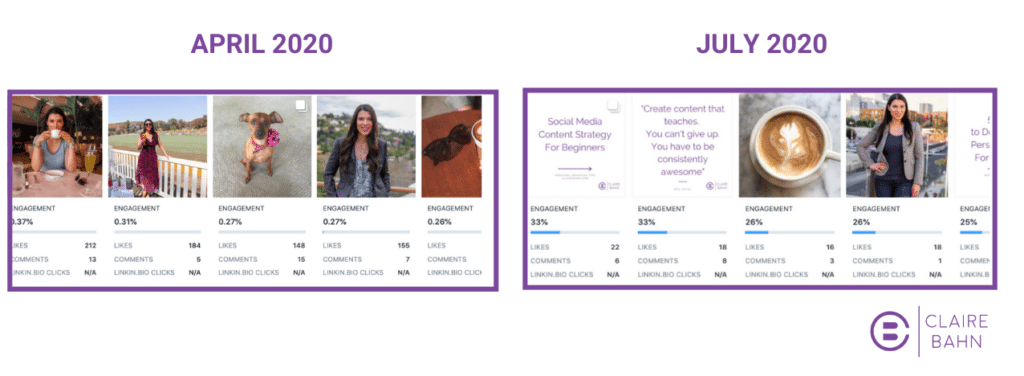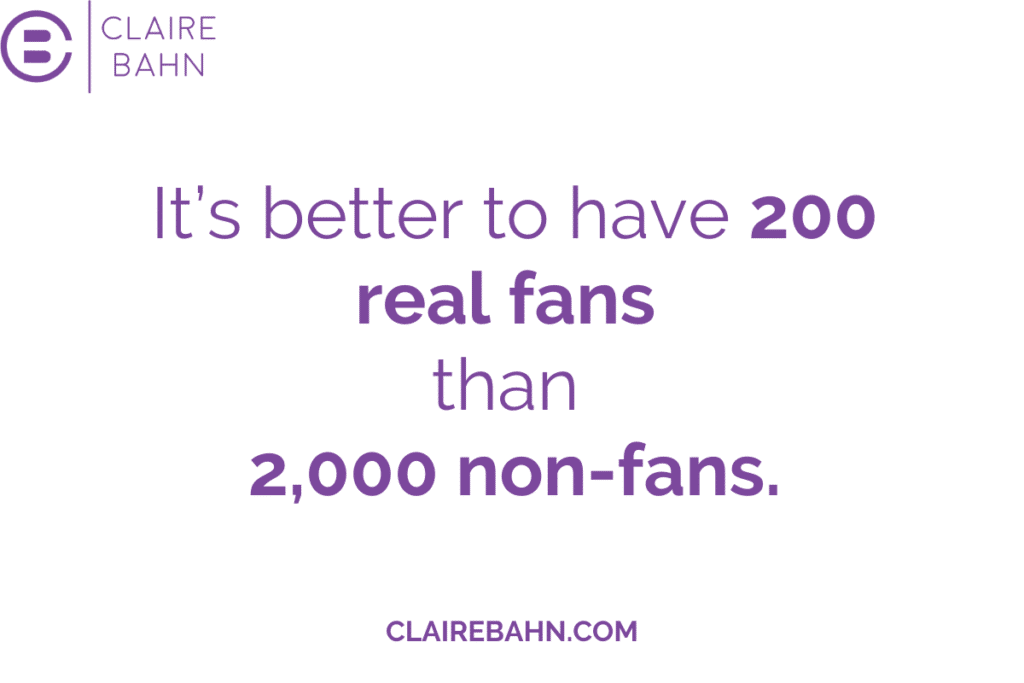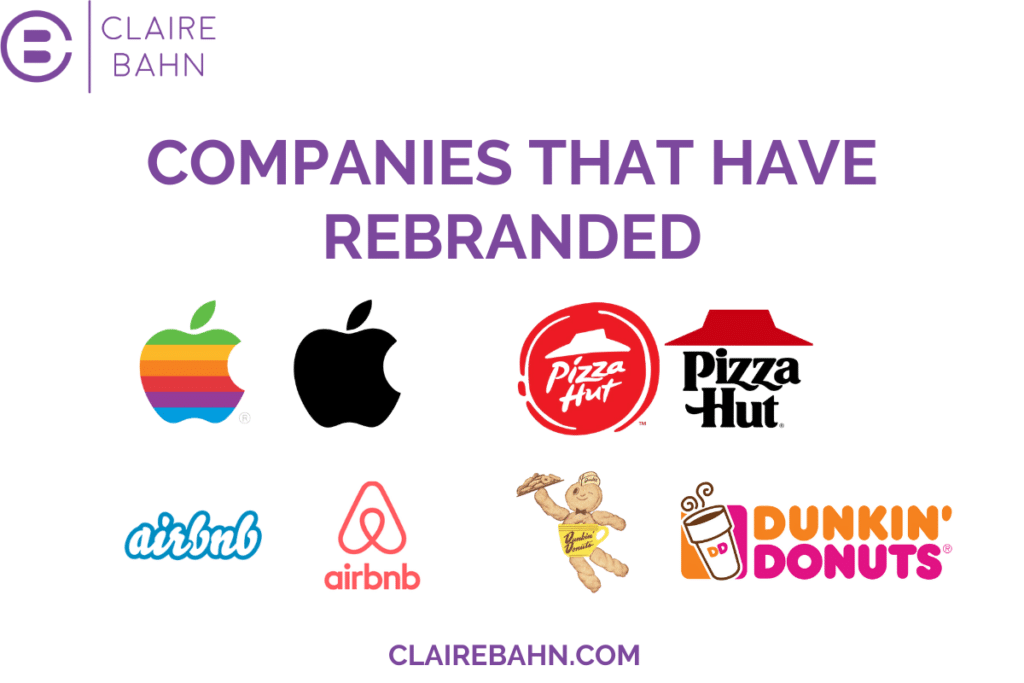Definition of a Person Who is Continually Rebranding Themselves
Last year, I made the difficult decision to rebrand. When you are confronted with the notion that it might be time to rebrand yourself, you're going to instantly associate that decision with failure.
But that's not at all what a rebrand means.
The fact is, we all change over time. Our looks change, our passions change, and our goals change. It would be ridiculous to expect our personal brand to remain the same throughout its existence.
That would be boring. And it would be a bad business move.
You should always be looking for ways to reinvent, scale, and reimagine your business. Most people associate a new brand to mean changing up the brand styling (i.e. your logo). While this is what most companies do in order to keep up with modern aesthetics, sometimes it's worth changing a companies overall mission statement.
In fact, Apple's 1995 "Think Different" rebrand is exactly what made it the success that it is today. As the former creative director puts it, this campaign alone, "play a pivotal role in helping Apple achieve one of the greatest corporate turnarounds in business history."
But here's what most people don't point out: you can also rebrand your personal brand.
When your passions change, your business model might change, your ideal client might change, and your personal brand statement might change.
That's what happened to me. And I had nearly 100K followers across my platforms.
A year later, and I still think a rebrand was the right call.
Here's What Happens When You Rebrand Yourself – My Experience

I started blogging around 2015. Back then, I was known as the Gluten-Free Avenger. And because this was prime time for both Avengers and the gluten-free movement, my blog took off.
For the next 4 years, I steadily built my following as an influencer. It was fun to work with brands, get free hotel stays, and cultivate a community of lifestyle fans who devoured my cooking recipes and travel hacks.
Until I wasn't happy.
Do you want to attract more clients and boost revenue?
Being a social media influencer wasn't my job. In fact, at the same time, I had built my own company, Online Profile Pros (formerly Dating Headshots, Inc.) Our goal is to help people with their personal brand messaging and digital footprint across various platforms. We retouch bios, take lifestyle images, and coach individuals on their online profiles. And anything goes; we help people get dates on Tinder and we help people land their dream jobs on LinkedIn.
The more successful OPP became, the more detached I felt from Gluten Free Avengers. So last year, I changed everything to, simply, Claire Bahn.
But Claire Bahn was tired of talking about How to Plan the Perfect Beach Pic nic . I wanted to talk about branding, social media marketing, and howI was able to build that 100K personal brand.
So I tried to mix in some of my business talk every other week alongside my lifestyle content— until I just couldn't do it anymore.
RELATED: DEALING WITH IMPOSTER SYNDROME – PRACTICAL ADVICE FROM SOMEONE WHO'S BEEN THERE
Here's What Happened When I Rebranded
Because Online Profile Pros was doing so well, my husband and I launched another branding business designated for 7-Figure personalities: Stratus Branding. At the same time, I wanted to leverage my existing personal brand to talk about all things business. So I made the full switch in my social media and blog content.
And nobody was listening.
Despite SEOing my blogs, using the right hashtags, and showing up consistently, my followers who originally came to me for lifestyle content seemed to drop off the face of the earth. The numbers were still there, but the engagement was… disappointing to say the least.
So, I went for the full rebrand. I wrote nearly 50 blogs on personal branding and created an entirely new Instagram account.
Here's what happened:
It's only been a few months since the full rebrand, but it's been a lifesaver. My engagement is at a steady 29% right now and I'm getting dedicated followers and potential clients.
This is why I've always said it's better to have 200 real fans than 2,000 non-fans (aka people who don't care what you're doing).
Just this year, I've scaled my business and onboarded my own team. Everything is moving a lot quicker. I even booked a speaking gig at one of the largest entrepreneur conventions in the country.
More than just financial success, my work-life balance is 1,000 times more manageable. Starting fresh with my personal brand opened me up to more possibilities because my message actually resonates with me. It makes creating content easier, it makes landing clients easier, and I feel more secure with my business than ever before.
So, should you rebrand yourself? If your message no longer resonates with you, I think it's not a matter of if you should— but when.
RELATED: THE FIRST 5 THINGS YOU SHOULD DO WHEN BUILDING YOUR BRAND
3 Reasons Why You Might Need To Rebrand Yourself

My reasons for rebranding might align with yours— but is it still the right move? Rebranding yourself can be as simple as slowly adding new content pillars into your brand. This is what I did until I slowly pushed my lifestyle content out of the mix.
Depending on your situation, you might need to make a swift rebrand. Maybe your business is failing, or perhaps you found yourself in some hot water. In these cases, it's best to rip the band-aid right off and get moving fast.
However, take into account how much work this rebrand is going to take. You're goin g to need a lot of help to restructure your personal brand's statement , not to mention the content overhaul you'll have to do.
So which boat are you in? Take a look at these three reasons why you may need to rebrand yourself.
RELATED: DEALING WITH IMPOSTER SYNDROME – PRACTICAL ADVICE FROM SOMEONE WHO'S BEEN THERE
1. You want to scale up
Your personal brand is present whether you're an entrepreneur, a CEO, or you work for a company. And it' s a significant selling point to both investors and your boss.
So whether you're looking to impress an investor or you're trying to convince your boss that you're ready for that new role, taking a more in-depth look into your personal mission is going to help.
Think about what you want people to say when they introduce you to their colleagues.
Without blatantly telling people who you are and what you do, you can help people dev elop this definition of your personal brand through the content you post. Is the work you're putting out there accurately displaying your expertise?
Believe it or not, that investor (and even those higher-ups in the company you work for) will go for the personal brand that is active on social media, no matter how big or small your online presence may be. Providing information on your personal platforms says a lot about you; it says you're selfless, confident, and you look like an expert in your field.
Make sure you're representing yourself the way you want people to see you. To be seen as a thought leader, you should be bold in your blogs and videos and talk about unpopular opinions. More importantly, you should be actively answering questions in your community to really boost your brand's like, know, and trust factors.
RELATED: THE FIRST 5 THINGS YOU SHOULD DO WHEN BUILDING YOUR BRAND
2. Your ideal client has changed
So what if you're already in your ideal industry? What's making you think that rebranding yourself is necessary at this point in your career?
If it's because you're not growing on social media, you're already in it for the wrong reasons. You can use social media to boost your career without completely changing your brand. It might be time for a minor facelift— but not a full rebrand.
However, if your social media following isn't growing, it could be because you haven't solidified your ideal client. Any time you create a piece of content for your personal brand, you should have a clear image of the person you're speaking to as if they were right in from of you. If you've been posting consistently, but you don't have this person in mind, I can guarantee you that's why your brand isn't growing.
On the other hand, a rebrand is typically necessary any time you switch industries, or you're looking to target a different audience.
For example, let's say you're a real estate agent who targets first-time family home buyers. What happens if your personal brand starts attracting high-income individuals who are looking at luxury properties? Then it's time to improve your personal brand's aesthetic; from the clothes you wear to the content you produce.
RELATED: 5 STEPS TO DEVELOPING A PERSONAL BRAND FOR BEGINNERS

3. To move away from an old persona
Perhaps the most common reason people look into changing their online brand is because they're looking to move away from an old persona.
As I said before, we're always changing. It doesn't matter if it's a switch in your appearance, your interests, or your career— anyone of these is reason enough to rebrand yourself.
I personally think that this is the most fun type of rebrand. You get to completely reinvent yourself from top to bottom. Usually, this adjustment starts because you've realized a new skillset or your mindset is entirely different from what it used to be.
RELATED: DO CEOS NEED THEIR OWN PERSONAL BRAND? 5 TIPS FOR EXECUTIVE BRANDING
Some Advice
My advice for anyone looking to move away from an old persona is to take a social break— online and offline. Go "dark" for a while and dig into what you want your personal brand to be. Your social hiatus can be as long as you want; just make sure you let your current audience know that you'll be taking a break.
Once you're ready to come back (with your new personal brand in tow), you're going to tell your audience about this change. Hype it up and get people to be excited for you . That way, you have the potential to carry your new audience into this new era, whether or not they'll be interested in your new content.
You'll be going through the transformational journey, and everyone likes to stick around to see if it works out. So you need to create suspense and excitement around your rebrand. This way, your audience will be excited to o, and they'll be rooting for you to succeed.
How To Justify a Rebrand

If you're still reading this, good for you! You know this decision does not (and should not) come easy. It will take so much time to put together an entirely new persona. And it's potentially wasted time if you're doing it
for all the wrong reasons.
So how can you justify a rebrand? Is it really worth taking time off to reinvent yourself?
First, let's decide whether or not a rebrand is necessary.
RELATED: HOW YOUR PERSONAL BRAND CAN FUTURE-PROOF YOUR CAREER
1. Look at your content
When you look back at the content you've made in the last year, do you feel detached? If you feel uninterested or unmotivated to create new content in your niche, then you might want to rebrand yourself. Sometimes we decide to switch gears because we feel like we've already put everything we have into our dedicated area of expertise.
Let's say you're an accomplished CPA. You've built up your clientele because yo u're extremely good at marketing. So maybe now, you're more interested in helping other CPA's market themselves. Your content will shift from expense write-off tips to explaining how other CPAs can share this information themselves.
In this case, you're taking on an entirely new direction. Your content is shifting from financial education to marketing education. Your ideal client is changing from everyday taxpayers to your fellow CPAs. This is when a rebrand is justifiable.
If this is the type of content that excites you, this is what you should be creating. It opens new doorways for you as well. You can hold onto your current clientele as a CPA, but now you can also create digital products and CPA courses to grow your revenue.
RELATED: 10 TIPS TO CREATE A STRONG SOCIAL MEDIA MARKETING STRATEGY
2. Look at your numbers
As I mentioned earlier, you're setting yourself up for failure if you're justifying a rebrand because of social media numbers. These are not the numbers you want to be looking at because they don't indicate whether your business is successful or not.
If you read my blog on vanity metrics, you'll start getting into the habit of looking at numbers that matter to your business. If your engagement has been steadily decreasing over the years, something is turning your audience off to what you have to offer. In this case, a rebrand is justifiable because you want to think about creating content and a business structure that resonates with your ideal client.
Use your social media Insights to see which content received the most attention in the last year. If you have a personal brand website (you should), then go through your Google Analytics to interpret user behavior. Where does your audience fall off?
Once you determine where you're lacking, you can start to format a strategy to get people interested again. If you're not interested in the content or the products you're creating, your audience going to be, either.
If you love what you're putting out, you probably need a personal brand strategist to give you a second opinion. While it's important to love what you're producing, you also have to create something your target audience will enjoy. A personal brand strategist can give you direction by analyzing your competitor's content and numbers to determine where you can improve.
RELATED: WHAT IS A PERSONAL BRAND CONSULTANT?
When You Shouldn't Rebrand

Alright, so far, we've covered:
- My personal rebranding experience
- Reasons why you should rebrand yourself
- How to justify spending time on a rebrand
If you're still not convinced a rebrand should be in your future, then let's discuss when you shouldn't waste your time.
1. When you're brand new
Many people are ready to start from scratch because they aren't hitting their goals and their numbers fast enough.
This is why patience is a virtue.
A slow start doesn't mean a failing brand. It probably just means you need a facelift— something a personal brand strategist can help you achieve.
So don't pull the rebrand trigger just yet. Instead, get the opinion of an expert. We'll be able to tell you whether or not your personal brand is set up for success.
2. Before addressing problematic issues
If you've been hit with a nasty lawsuit or someone trashed your brand on social media, do not turn everything off and start creating new accounts. Trust me; people will still find it and continue to tarnish your reputation.
By refusing to address a problem associated with your persona;l brand, you risk destroying your new persona before it even launches.
Address any problems with a sincere apology, and then tell your audience you're going to take a break to reevaluate. After taking some time off to work with a personal brand coach, that's when you can come back to let them know you've decided to rebrand yourself.
Make it seem like their words helped you see past your errors and that you're ready to move forward with your new personal brand statement.
3. When you have nothing to bring to the table
And finally, don't switch niches because the old one didn't work out or because you got bored. You still need to have tangible skills to bring to the table. If you're still learning, now is not the time to rebrand.
Instead, use this time to build your skillset quietly. Once you think you have the knowledge to push yourself into a new industry, start creating a plan to build up this new business.
- Which content will you post on social media?
- What will be your specialty?
- Do you have social proof to convince others of your newfound expertise?
Sometimes it's worth taking a few proton jobs to get these testimonials. You can also apply for internships (they're not just for college students) or elicit the help of a mentor to get your foot in the door.
RELATED: WHAT IS THE VALUE OF YOUR PERSONAL BRAND?
5 Ways to Rebrand Yourself For Success

There are various reasons why a rebrand may be on your mind. Maybe you're losing sales or maybe you went viral and you haven't figured out how to scale your brand from that opportunity.
Another reason to rebrand is simply a change in the times. Household brands like Dunkin Donuts have rebranded to make a mark on their new products, while brands like Uber changed their logo for a more contemporary look.
Now that we've covered just about everything, let's get into strategy. You know you need to rebrand. How can you make sure it's a success?
As your unofficial personal brand strategist, here are my 5 ways to ensure your rebrand produces success:
1. Change Your Aesthetic To Demolish the Competition
While style branding is just one tier of your personal branding strategy, changing your brand's logo, colors, and overall look can work wonders to set you apart. According to Oberlo, using a signature color can increase brand recognition by 80%.
If you're not seeing the traction you would like, it could be an issue with your branding. Maybe it doesn't stand out enough or maybe your font is too hard to read. That's where a branding designer comes into play (we offer this at Stratus Branding). They're the experts when it comes to differentiating brands from their competition. This is why I use purple instead of the traditional pink that you see in most female entrepreneur brands. I easily stand out without having to do much else (plus, it's my favorite color).
Pro-Tip: In order to figure out which colors or fonts are unique in your industry, search your industry hashtags on Instagram. Visit the accounts in the top 9 posts (if they're a personal brand) and make note of their colors and fonts. You'll probably start to notice a theme. Those are the colors and fonts you're not going to use in your personal brand marketing.
2. Cut Ties With The Toxic
Let's face it, there have been hundreds of cases where celebrities or influencers have been shamed for associating themselves with toxic people. But it's actually much bigger than that.
CEOs and even actors are known for their personal brand. This is why they have to be really careful about how they act and what they say. Toxic behaviors or outbursts can damage your reputation (and your brand) in an instant. That's the reason why Mike Jeffries is no longer the CEO of Abercrombie & Fitch, and it's the reason why you never see people like Charlie Sheen in films or TV anymore.
If you have been heavily scrutinized because of someone within your inner circle, it's probably time to cut ties and rethink your message. When it comes to your personal brand, what you believe in is what gets people to like, know, and trust you. If you're close with someone who is widely perceived as someone with a negative message, you'll fall on that sword right along with them.
So— it's time to cut ties.
This strategy works even if we're talking about a business partner, a colleague, or just a friend. If they're causing chaos and destruction to your business or they're simply not supporting your business goals, it's time to change up your inner circle. Find people who truly value your mission statement. Then, use this opportunity to showcase your brand in a more authentic and admiral light.
3. Expand and Bump Your Prices
Did you know that PBR sells for $44 a bottle in China?
PBR, the same beer you can buy for a dollar at happy hour at any given bar here in the States.
That's because Pabst Blue Ribbon knew that they could leverage their 176-year-old brand as a classic commodity in China (where they know about PBR's low price tag).
You can do the same thing with your personal brand. If you've been given the chance to pursue opportunities in a different field or you've been invited to work with an international brand, raise your prices.
Even if you're simply branching into a new local market, use this opportunity to rebrand as something unique— as something that stands slightly apart from your personal brand.
This is kind of what I did. My influencer brand wasn't really doing much for me except inflating my social media numbers. But instead of letting that all go to waste, I rebranded myself and carried over my expertise so that I could bump up my prices and scale my business to a point that I never could with just a lifestyle blog.
4. Know Your Niche
When you're just getting started with your own company, you instantly know your market and your industry. Social media managers want to be seen as an expert within the marketing industry, writers may want to "make it" within the journalism circle, and makeup bloggers want to be seen in the beauty community.
Take a moment to really think about which industry you're in, and write it down. Now, write down three different categories within your industry that people are known for.
For example, in branding, I could be known for website design, style design (i.e. logos and graphics), or I could be a branding coach.
Clearly, I choose a branding coach. However, I niched down even further to brand myself as a personal branding strategist.
In order to know your niche for when you rebrand yourself, you need to map out a web of possibilities. Start with your industry, list three potential sub-categories, and then niche down each of those categories even further.
Out of all of those options, which section do you know the most about? Which one can you see yourself being the expert in?
RELATED: Top 5 Benefits of Outsourcing For Your Business
How To Be Seen as an Expert
Let's look at another example. You're in marketing. You could be an SEO expert, a social media manager, or an advertising mastermind.
Maybe you're better at social media management than you are Facebook ads. So you've chosen the SMM niche.
As a social media manager, which platform do you enjoy managing the most? Which platform analytics are you the most in tune with? Are you always on top of Instagram's newest features or do you know all the tips and tricks to be seen on LinkedIn?
From there, choose which one suits you best. Let's assume you're really good at Instagram.
Just like that, you've rebrand yourself from a marketing expert to a social media manager to an Instagram strategist.
Now you can create an even more refined message and detailed content around your new image (and maybe choose new colors and fonts to go along with it!)
5. Improve Your Content Strategies
One of the first things I wanted to do for my rebrand was to get out as much content as possible. If you go back far enough, you'll see that my blog is saturated with traveling and cooking content. This means that it's going to take a while for Google to see my website as an entrepreneur website because my website is ranking for all the wrong keywords.
So, I set out to get as many blogs on personal branding published as I could with the right SEO keywords. Slowly but surely, my website is being bumped up on categories like "personal brand statement example." I'm about 3 links away from being on the front page of Google for that keyword.
And I wrote that blog just 90 days ago.
So when you're rebranding, figure out what your keywords are (this goes for SEO on social media, too) and use them strategically. Build content around those niche keywords and put out as much content as possible.
Do you want to attract more clients and boost revenue? Learn how to position yourself as an expert, grow your audience, and attract the right clients. Watch my FREE Personal Branding Masterclass today.
Source: https://clairebahn.com/rebrand-yourself/